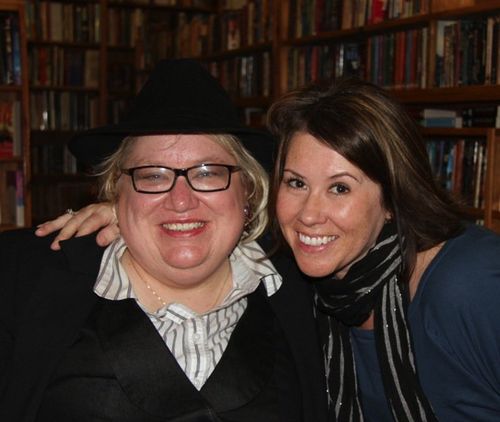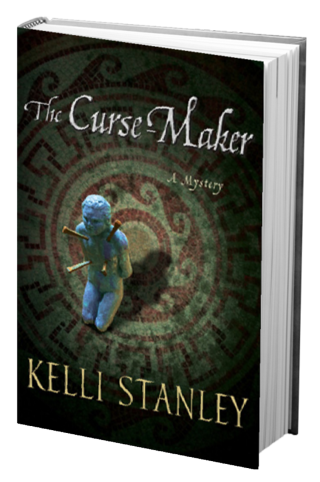
December 23
Day 23
Kelli Stanley Interview
Before I get on with today's post, I want to remind you I'm donating $1 for every new Twitter follower between now and December 31 to Reading is Fundamental. Details here.
Due to some wires getting crossed (yeah, I know–but it still happens in this wireless world), I didn't include an interview in my recent post about Kelli Stanley. Yesterday, Kelli was kind enough to answer my questions post haste, and as a result, today I'm featuring her again.

Me & Kelli at the Mystery Bookstore
1) You write two historical crime series, one set in Roman times and the other set in 1940s San Francisco. Is one easier/more fun to write than the other?
Hmm. Good question! I'd say that neither series is easier to write than the other, but that because the Roman series is lighter, it's easier on me emotionally and offers a good contrast in tone–Arcturus, though facing his share of internal issues, has a loving bond with Gwyna that makes him a much less psychologically dark person than Miranda.
With the Roman noir novels, I get to be a bit playful, too, but as anyone who has ever performed comedy knows, "lighter" doesn't mean easier. And while hardly comedic, "Roman noir" is a pun on the French literary term as much as it is a description of time, place, and style–so the expression of it in the series is an acknowledged tribute to the genre as a lens through which we can view life.
My goals for both series are different, too–with the Roman series, I'm trying to make a very remote and
seemingly alien culture become more accessible for the modern reader–trying to demonstrate how little has changed within human behavior, and why, therefore, history is relevant. With Miranda, I don't even see the series as "historical" … really, it's my own peculiar attempt to examine our very recent past, question the mythology we've built up around it and ourselves, and rewrite the rules of noir without the gender stereotypes and Hays Office censorship code that pervaded the entertainment media.
I will confess that I enjoy spending time in 1940 more than in 84 AD, because I've always been drawn to that particular era … so in terms of setting, the Miranda series wins out. 🙂

2) Describe your perfect San Francisco day.
Well, a perfect day would mean a day off from the day job. We’d start with the weather—about 63 degrees, sunny, a few clouds, and a breeze from the West. I’d get up early, walk the dog, check email, and probably head to the San Francisco Public Library—main branch—to browse through the newspapers for research and (if I have time), the History Room.
I’d grab lunch in Chinatown (of course), snap a few photos, and get home in time to settle down to a few good writing hours for the next Miranda. I’d reach a benchmark—usually the end of a scene, sometimes the end of a chapter—feel good about it, check email again, make dinner, and settle down with a book before bed, or possibly a DVD. Or maybe more research … I’ve been known to take large, dusty newspaper compilations into the kitchen or bedroom when I’m on a research jag.
That probably sounds terribly boring … but honestly, writing is not something I’m free to do full time or even every day, so for me—it’s perfect!
3) Where do you do the majority of your writing?
I alternate between two places: in front of my computer, which is a Dell 64 bit I purchased after I sold CITY OF DRAGONS (I wrote my first three books on a Dell, so I had to buy another), and my writing desk, which is where I go over hard copy edits and do most of my plotting, thinking and research. These are both in one room, facing opposite walls. I do a bit of writing outside the house—on the bus, occasionally, or whenever something strikes me. Sometimes in the shower! The truth is, I’m actually writing ALL the time, in my head, once I’m working on a book, but the act of putting words to paper usually happens in front of my computer (or, if I’m on the road, on my laptop).
4) Writing aside, what is your greatest aspiration?
It’s just about impossible for me to put writing aside, because it really IS my life. I devote all my time and energy to it, and we sacrifice quite a bit of other things (like movies, museums, vacations, etc.) to make sure I have both the time to write and the equally necessary time to tour, promote, etc. Writing is my passion but it is also a business, and—as a former small business owner—I can testify to the fact that ANY business you begin will take over your life. So … my greatest aspiration is to be able to write full-time, to be successful enough for that to be a reality.
If I force myself to take writing out of the equation, we still come back to a related aspiration: make the world a better place. Sounds corny, but it’s true—and writing is the way I’d like to contribute to the world, to help people. I have a profound respect for the power of any creative act, and believe as a matter of principle that writers, artists and creative people should use the power they wield for the good of the world, not to exploit it.
5) What inspires you, in writing or otherwise?
People inspire me. They fascinate me … and, even though I’m a noir writer—and maybe because I’m a noir writer—I believe that they’re fundamentally good in many ways. Hearing stories from people I meet is wonderfully inspirational, and my family in particular has always been an inspiration to me on every level of my life.
Film noir, of course, has been hugely influential. My first novel, NOX DORMIENDA, and the whole idea of “Roman noir” was conceived during one of my annual pilgrimages to the Noir City Film Festival in San Francisco. Great narrative film-making in general inspires me and certainly informs my style of writing.
Books and other writers—of course. Raymond Chandler, Hammett, Woolrich, Hemingway, Steinbeck, Fitzgerald … I love the lyrical in writing, and used to spend my time in classes writing poetry when I should have been studying the topic of the class! Poetry has always been a major inspiration, and I adore writers or playwrights that touch on the lyrical—Tennessee Williams, for instance, or Eugene O’Neil.
Nature inspires me. I grew up in a rural, remote area, surrounded by animals, wild and otherwise. My love of nature and desire to protect what wildness we have left on the planet generally crops up in the Roman noir series, and is something I share with Arcturus.
Finally, San Francisco and the 1930s/40s—with Art Deco style, Big Band swing, long, low cars and skyscrapers—is a constant source of inspiration, and I try to convey some of the beauty of the era in the Miranda books.
Thank you for stopping by, Kelli!
If you're buying books as gifts this holiday season, please consider purchasing from your local independent bookshop. The level of customer service you'll receive is unmatched, you'll have the added benefit of making new friends of the staff, and you'll help support a local business.
Some of the books featured in this post can be purchased from the Mystery Bookstore in Los Angeles (orders@mystery-bookstore.com).